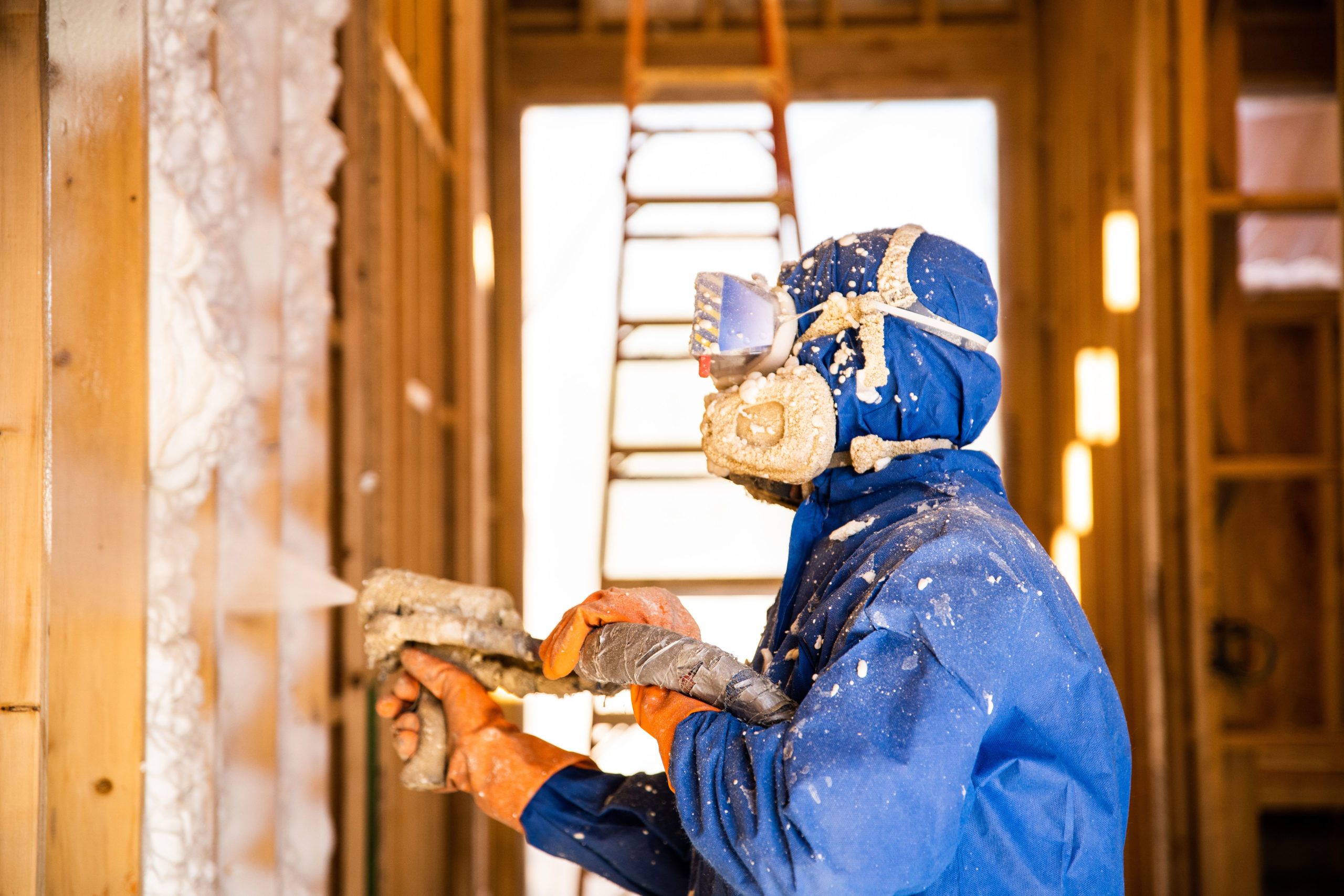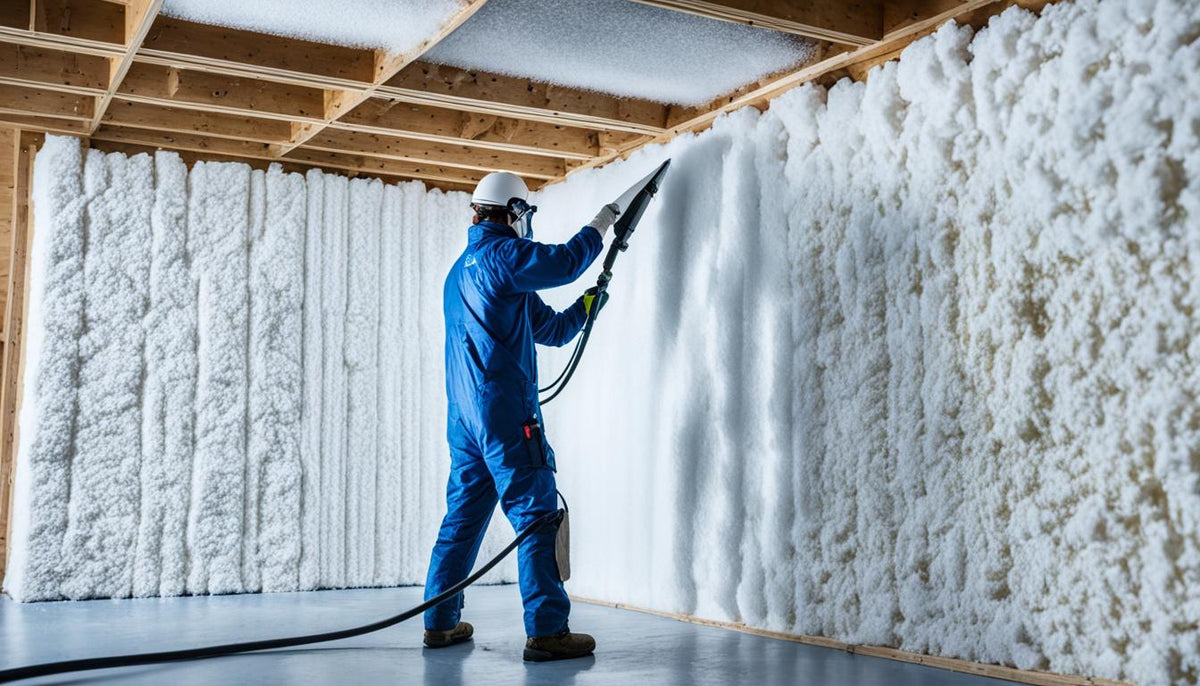Frequently Asked Questions About Spray Foam Installation and Usage
Frequently Asked Questions About Spray Foam Installation and Usage
Blog Article
Spray Foam: The Ultimate Remedy for Air Sealing and Insulation
Spray foam insulation has arised as a leading remedy for reliable air securing and thermal insulation, supplying a distinct combination of residential properties that establish it apart from conventional methods. Recognizing the full extent of its advantages, installation processes, and comparisons with various other insulation kinds is important for making educated choices.
What Is Spray Foam?
Spray foam is a versatile insulation material that incorporates the principles of air securing and thermal resistance to improve energy performance in buildings. Made up primarily of polyurethane or various other similar substances, spray foam is applied as a liquid that expands upon contact with surfaces, developing a strong, constant layer of insulation. This one-of-a-kind home enables it to load gaps, fractures, and gaps that typical insulation materials may overlook, providing a remarkable air seal.
There are two major types of spray foam: open-cell and closed-cell. Open-cell spray foam is lighter and a lot more flexible, using outstanding noise absorption and a reduced R-value per inch - Spray Foam. In contrast, closed-cell spray foam is denser, supplying a greater R-value, moisture resistance, and included structural stability to constructing components
The application procedure usually involves specialized tools, ensuring a seamless application that follows numerous substratums, consisting of timber, steel, and concrete. This adaptability makes spray foam suitable for both new buildings and retrofitting existing frameworks. Its ability to create a closed barrier considerably adds to reducing energy usage and boosting interior air quality, thereby making it a preferred selection among home builders and property owners alike.
Advantages of Spray Foam Insulation
One of one of the most considerable advantages of spray foam insulation is its outstanding capacity to create a continual air obstacle, which efficiently minimizes power loss. Unlike conventional insulation products, spray foam broadens to fill up spaces and splits, ensuring that air leakage is dramatically minimized. This characteristic not only boosts energy performance however likewise causes decrease utility costs with time.
In addition, spray foam insulation provides superior thermal resistance, adding to a much more secure indoor environment. Its high R-value per inch enables for efficient insulation in confined areas, making it suitable for attics, wall surfaces, and crawl areas. The moisture-resistant residential properties of spray foam assistance prevent mold and mildew and mildew development, advertising healthier living conditions.
Another crucial benefit of spray foam insulation is its sound-dampening high qualities (Spray Foam). It successfully reduces sound transmission in between spaces, creating a quieter and more comfy home environment. The sturdiness of spray foam likewise stands apart, as it does not sag or clear up in time, maintaining its performance throughout its lifespan
Exactly How Spray Foam Works
Understanding how spray foam insulation works is essential for appreciating its efficiency in air securing and thermal resistance. Spray foam insulation includes 2 primary parts: isocyanate and polyol material. When these elements are combined, they undertake a chemical reaction that causes the material to increase swiftly, producing a thick foam that fills up gaps, cavities, and cracks.
As the foam expands, it sticks to surfaces, creating a closed seal that significantly reduces air infiltration. This particular makes spray foam insulation extremely effective at protecting against drafts and wetness infiltration, which can result in energy loss and damage in time. In addition, the closed-cell variant of spray foam provides premium thermal resistance due to its rigid framework, successfully minimizing warm transfer.
The one-of-a-kind buildings of spray foam enable it to adapt to irregular surface areas, making certain extensive coverage and a seamless barrier. Therefore, spray foam insulation not just improves power performance but likewise contributes to enhanced interior air quality by minimizing the accumulation of contaminants and allergens. Eventually, understanding the technicians behind spray foam emphasizes its role as a superior selection for insulation and air sealing in both business and domestic applications.
Setup Refine Overview

Prior to installment, the space must be sufficiently cleaned up and prepped, making certain that surfaces are cost-free from particles, dust, and moisture. This step is critical because pollutants can endanger attachment and overall performance. As soon as the location is prepared, the application entails mixing both elements of the spray foam, which increases upon call and loads voids effectively.
Trained professionals ought to carry out the installment, making use of customized tools to make certain consistent coverage and optimal thickness. Safety and security precautions, including wearing protective equipment and making certain proper ventilation, are crucial throughout this procedure. After application, the foam normally remedies swiftly, developing a solid barrier that enhances energy efficiency.
Comparing Spray Foam to Traditional Insulation
When evaluating insulation alternatives, spray foam insulation attracts attention in contrast to standard materials such as fiberglass and cellulose. One of the primary benefits of spray foam is its remarkable air sealing capabilities. Unlike fiberglass and cellulose, which can allow air seepage, spray foam broadens upon application, filling gaps and spaces to create an impermeable seal. This leads to enhanced power effectiveness, as less warmed or cooled down air escapes the home, resulting in reduced energy bills.
In addition, spray foam supplies a greater R-value per inch than standard insulation types, using more efficient thermal resistance in a thinner profile. This particular is specifically valuable precede with minimal tooth cavity deepness. Furthermore, spray foam is immune to moisture and mold development, which can be a why not try this out considerable interest in cellulose and fiberglass, especially in moist atmospheres.
Nevertheless, spray foam insulation commonly carries a greater in advance expense than its typical equivalents. Home owners should evaluate this first investment against lasting power savings and performance benefits. Inevitably, while both insulation kinds offer their purpose, spray foam emerges as a much more innovative remedy for modern insulation needs, especially in regards to air securing and thermal performance.

Conclusion
In summary, spray foam insulation represents a highly effective solution for achieving optimal air sealing and thermal resistance. Its unique homes, including wetness resistance and sound dampening, make it suitable for various applications in both brand-new constructions and retrofitting projects (Spray Foam). The preliminary costs might be greater compared to traditional insulation products, the long-lasting benefits, such as substantial energy check over here savings and boosted interior air quality, warrant the financial investment and underscore its worth in contemporary structure methods.
Spray foam insulation has arised as a leading service for effective air securing and thermal insulation, providing an unique mix of homes that establish it apart from standard methods.Spray foam is a functional insulation material that incorporates the principles of air securing and thermal resistance to enhance power efficiency in web link structures.When assessing insulation alternatives, spray foam insulation stands out in comparison to typical materials such as fiberglass and cellulose. Inevitably, while both insulation types serve their objective, spray foam emerges as an extra advanced option for modern-day insulation requirements, specifically in terms of air sealing and thermal effectiveness.
In recap, spray foam insulation represents an extremely effective service for attaining optimal air sealing and thermal resistance.
Report this page